Put the 'I' back in team
By Tracy Crow
Categories: Leadership, School leadership, System leadershipJune 2008
Teamwork is one of those words with the power to make me cringe no matter how much I sincerely believe in the concept behind it. I suspect I’m not the only one. Yes, we’re all for team building, being a team player, taking one for the team, putting team before self. Why has it become a little hard to believe? Have we heard these clichés too many times?
Even for those of us who went to school before cooperative learning involved much cooperation, the value of working on an effective team is obvious. To state the reasons would add to my list of overused phrases. Touting the benefits of teamwork has become second nature to anyone who has applied for a job in the past 10 years, acknowledged a coworker, or won a basketball game. Maybe that’s the problem. Once you’ve experienced being part of a good team, you believe in teams. You don’t really put much thought into the concept anymore. You forget that teamwork isn’t a matter of faith. Good teams require effort and skill. Teamwork isn’t an end in itself; teams exist for a reason.
I’m concerned the same thing might happen with professional learning communities, or as the lingo goes, PLCs. There are enough people in the right places doing the right things with professional learning communities that we’re hearing about wonderful results for students, teachers, and schools. You can read about several examples in this issue of JSD. With the results learning communities can achieve, many schools are ready to start a PLC, become a PLC, do a PLC. The term professional learning communities is already so common in our field that it threatens to become overused and misunderstood. Based on the reading that informed this issue and discussions with many educators, I believe the term is used far more widely than the concept is applied effectively.
Like teamwork, the the benefits of professional learning communities may be so obvious that educators don’t realize how much thought and effort communities require. We don’t realize that we can’t take professional learning communities for granted — we’re barely getting to know what they’re all about. As Judith Warren Little said to me (see interview on p. 53), there is still so much research to be done in this arena.
Enabling teachers to meet together every day does not make them a professional learning community. Becoming a professional learning community requires intention, a focus on learning, a focus on results, a commitment to collegiality, and a willingness to reshape a school’s culture. The hard work of learning communities goes well beyond a lightning bolt of inspiration from a workshop or our comfortable ideas about teamwork. Professional learning communities hold so much promise for improving student outcomes. But the concept is still young, and we’re not experts in this field — not yet. I don’t want to become cynical about something so important, at least not until “doing PLCs” for real is second nature.

Tracy Crow served as chief strategy officer for Learning Forward.
Categories: Leadership, School leadership, System leadership
Recent Issues
LEARNING DESIGNS
February 2025
How we learn influences what we learn. This issue shares essential...
BUILDING BRIDGES
December 2024
Students benefit when educators bridge the continuum of professional...
CURRICULUM-BASED PROFESSIONAL LEARNING
October 2024
High-quality curriculum requires skilled educators to put it into...
LEARNING TO PIVOT
August 2024
Sometimes new information and situations call for major change. This issue...









